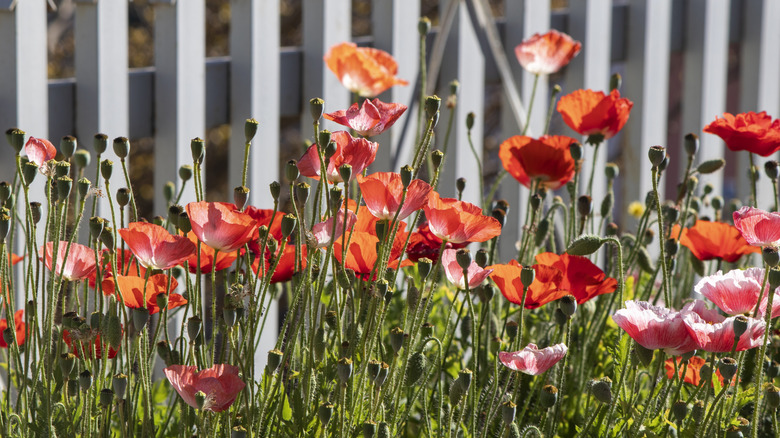The Perfect Time Of Year For Planting Poppies Isn't What You'd Expect
Sowing seeds and planting a new garden are most often thought of as springtime activities. However, fall is a great time to start gardening, and surprisingly, some seeds are actually best planted in the winter. One prime example is the poppy (Papaver spp.), which will thrive when sown outdoors in January and February. That's because, in order for poppies to grow happy and healthy, they need to go through a process called cold stratification.
Essentially, poppy seeds need to go through a cycle of freezing and thawing before they can sprout and eventually bloom. The cold is key to helping kickstart germination at the right time; it helps break down the seed's hard shell to allow the seedling to break through. It's a process that can be artificially mimicked using a refrigerator; however, if you live in a climate with cold winters, sowing poppy seeds outdoors is easier — and more effective.
Because poppies don't need to be buried and require plenty of light, they benefit from broadcast sowing, i.e., scattering them by hand on top of the soil. Simply sprinkle them evenly all over your chosen area, either right before a snowfall or directly on top of snow that's accumulated 2 inches or less. Now, it's time to let Mother Nature do the work for you.
Top tips for planting poppies in winter
When choosing the perfect spot for poppy seeds, make sure you're sowing in an area with plenty of sunshine and well-draining soil. What's more, avoid grassy spots, as well as anywhere covered in mulch, as the seeds need access to soil to thrive. Keep in mind that field and opium poppies are reported to be invasive in West Virginia. At the same time, know poppies are quite finicky and should not be moved once planted, so choose your location wisely.
If there is any debris on the ground, simply pick it up or rake it away, then get sprinkling! Just keep in mind that these tiny seeds can be easily blown away, so don't plant them on a windy day. By the same token, it's hard to spot them once they're sown, so take careful note of where you're dropping them.
In addition to thriving in cold temps conducive to seed stratification, poppy seeds also benefit greatly from the snow itself. The white powder will actually act similar to mulch and will protect your seeds from wind, sun, and animals. What's more, once it begins to melt, it will release water and nutrients, which means you don't have to water them until early spring, right as they get ready to bloom in late May.
While you're at it, there are plenty of other plants also suited for winter sowing, such as bilberry, chamomile, lavender, sage, and violet. If you're unsure, check the USDA's plant hardiness map to confirm which plants will thrive in winter in your specific region.
